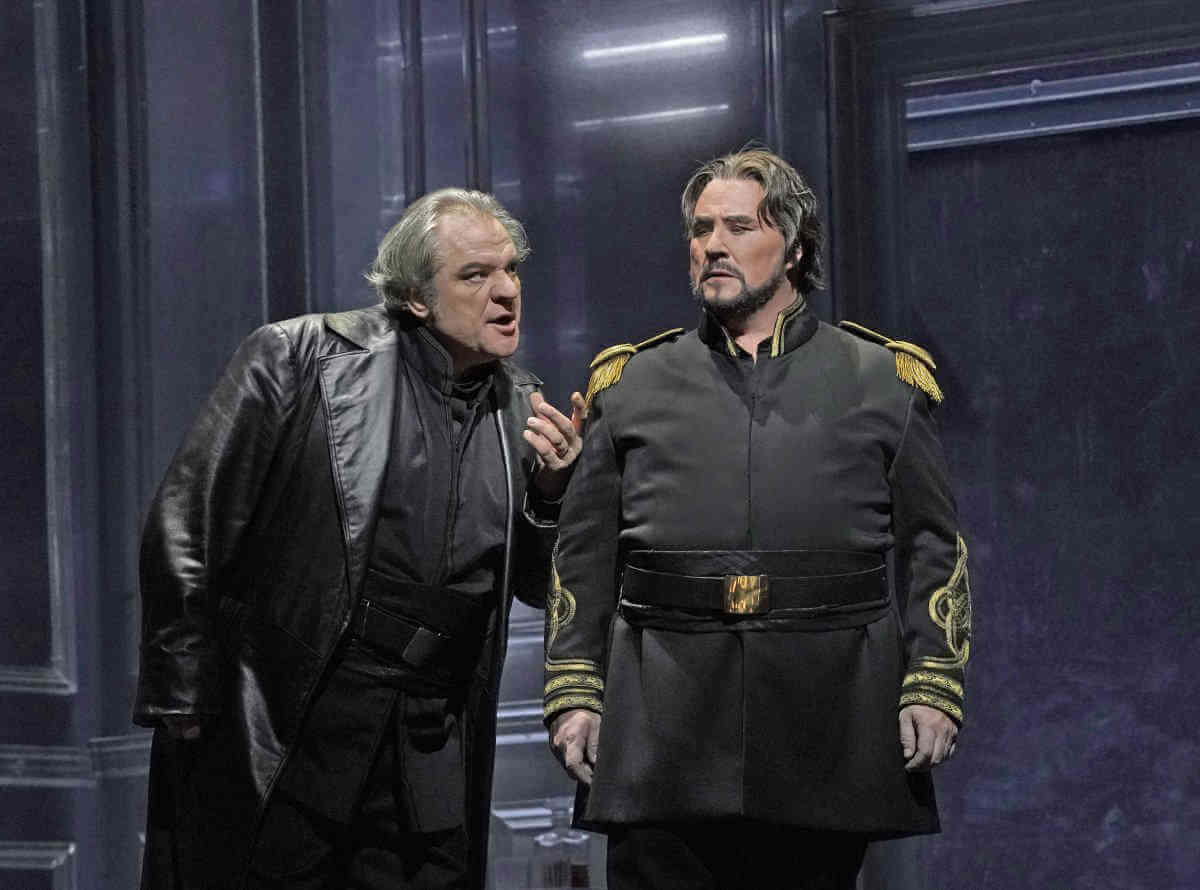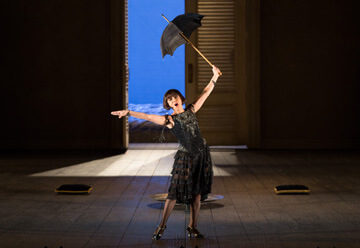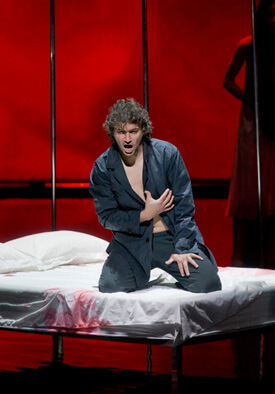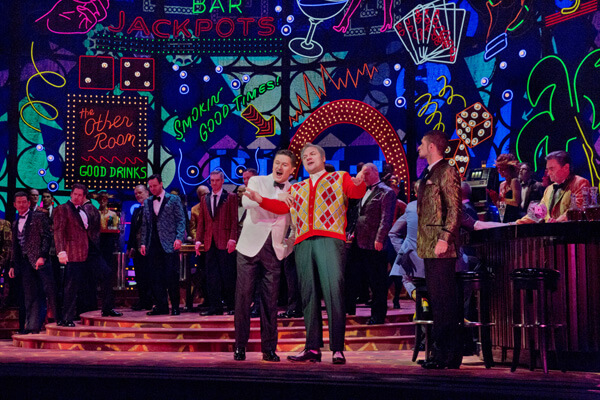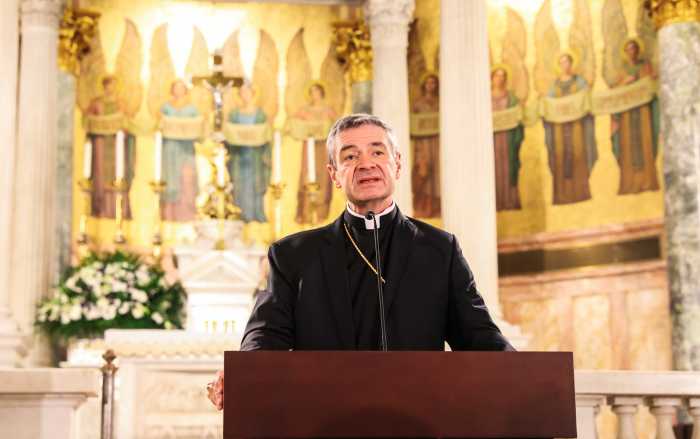One of the most anticipated events of the 2018-2019 Metropolitan Opera season was the debut of podium superstar Gustavo Dudamel leading a revival of Verdi’s “Otello.” His conducting lived up to the advance hype and in certain areas exceeded expectations. Dudamel has made his mark as a symphonic conductor and indeed he revealed all the details of Verdi’s mature orchestration. He is also known as a dynamic musician and the Met Orchestra sounded newly energized as it hurtled itself headlong into Verdi’s score with thrilling attack. But under his baton, the orchestra also demonstrated the ability to turn on a dime with delicate and subtle playing. Less expected were Dudamel’s abilities as a musical dramatist — he drew out colors from the orchestra that brought Verdi’s tragedy to vivid theatrical life. In fact, the orchestra often outdid the singers in dramatic expression and intensity. Dudamel proved a worthy successor to such historical Met “Otello” conductors as Toscanini, Szell, Solti, Carlos Kleiber, and James Levine.
Unfortunately, the new maestro’s skill could not overcome scheduled performers plagued by illness and vocal problems in a production that strands the story in a dramatically alienating, visually ugly neverland. I attended the December 28 performance to hear Julianna Di Giacomo as Desdemona since I had heard Sonya Yoncheva sing the role when the production premiered. Cover tenor Carl Tanner had stepped in for the indisposed Stuart Skelton on opening night and he also deputized for him on the 28th. Zeljko Lucic returned as Iago. From what I heard on the later Saturday matinee radio broadcast on January 5, Skelton never recovered his vocal form and was audibly stressed in the upper register. On the radio, Yoncheva showed that her headlong assault on the heavy soprano repertoire has widened her vibrato while shrinking her upper register, which is now plagued by shrillness and pitch problems.
The two American alternates had no such vocal problems on December 28. While not terribly imaginative in his vocal or physical acting, Tanner had the role solidly in his voice and knew exactly what he was doing musically. The out gay former bounty hunter possesses an effortlessly powerful dramatic tenor with a bright ring. Unlike the plethora of baritonal Otellos in Met history (including Vinay, Vickers, and Domingo), Tanner has real tenor resonance from top to bottom, so rather than pushing the tone upward he soared up to the high B’s and B flats. This was not the blunt singing I had heard from him in the past. Tanner proved a dramatically basic Moor who wasn’t helped by Bartlett Sher’s production eschewing blackface while failing to provide any alternate signifier that Otello is “other.” One never got the sense that this man was a powder keg with a long fuse that Iago ignites. You have to wonder what Tanner could do in this opera with intensive direction; the goods are there vocally.
Desdemona used to be a role given to Aida voices like Caniglia, Milanov, and Tebaldi but recently has gone to mature lyric sopranos who have moved on from singing Mimi and Violetta. Di Giacomo’s firm, gleaming soprano had that heroic thrust too seldom heard in her confrontations with Otello. Di Giacomo soared above the grand concertato in Act III but could float her tone with a soft sheen in the Act IV “Willow Song” and “Ave Maria.” I’d love to hear Di Giacomo take on some of the youthful Wagnerian heroines like Elisabeth and Elsa.
Lucic, whose glowering, recessive Iago was such a dead weight at the production’s premiere, seemed to be galvanized by Dudamel’s leadership. Though still saturnine and low-key in his villainy, he was full of insinuating menace behind the false façade of a laid back “regular guy” persona. His burly baritone roared out thrilling high notes in Iago’s “Brindisi” and “Credo” but also could whisper hauntingly in “Era la Notte.” Verdi turned Emilia from a leading character to a comprimaria but Jennifer Johnson Cano made her a major player in her limited opportunities. Alexey Dolgov proved an excellent stage actor as Cassio but his Slavic tenor lacks Italianate flow and open vowels.
Sher’s production was more hopeless than ever. Whatever specific dramatic direction that remained was lost amid the murk of Es Devlin’s projections that look like the aurora borealis or computer screensavers and Donald Holder’s shadowy lighting. No one onstage or in the audience could relate to this environment. On this occasion, Maestro Dudamel did not have to do as much damage control since all three singers had the vocal goods. But he and the Met Orchestra were driving the music drama, not the singers or production.
Boito’s quirky and sprawling “Mefistofele” has always lurked at the edges of the standard repertoire waiting for the right combination of performers. Boito as librettist shifted the focus from the tragic love story of Faust and Gretchen (central in the Gounod “Faust”) to include more of Goethe’s epic poem such as Faust’s classical interlude with Helen of Troy. Boito as composer takes all sorts of harmonic and structural left turns, keeping the audience on their toes while delivering heaps of old-fashioned Italian melodies and flattering vocal showpieces for bass, tenor, and soprano.
The Met cast three present and future stars in the lead parts. In the title role, rising star bass-baritone Christian Van Horn (the recipient of the 2018 Richard Tucker Award in a breakout season) stepped out in his first star role. Tall and imposing with a broad chest often stripped to the waist and long legs filling out the Devil’s red pants, he visually proved a worthy successor to Samuel Ramey in Robert Carsen’s 30-year old production. If he was visually larger than life, vocally the American bass made a rather human-sized Devil with a mellifluous bass-baritone a little short on decibels and on the lowest notes. Van Horn has gorgeous legato and firm tone but that spine-tingling superhuman quality was missing.
As Faust, tenor Michael Fabiano showed a tenor voice in transition that was suffering from not only a cold but also unresolved technical issues. Fabiano’s middle register is broadening and darkening revealing spinto potential but his upper register simply cannot take pressure without breaking. Difficulty navigating the passaggio (upper middle break) resulted in some stressed high A’s and B flats that shattered under the stress. When Fabiano took off the pressure — as in “Giunto sul passo estremo” in the final epilogue — a singer of some finish and elegance emerged.
As Margherita, dramatic coloratura Angela Meade initially seemed odd casting: she was unconvincing as a wide-eyed ingenue in the Garden Scene. The wide-ranging demands of “L’Altra Notte” revealed a different and more exciting singer who combined bel canto finesse in the fioritura flourishes with verismo intensity in her diction and use of the chest register. Her death scene was moving.
Jennifer Check looked glamorous as Elena in the Classical Sabbath scene (she has slimmed down a lot) but the voice sounded hollow and edgy with no warm core. The Met chorus outdid themselves in their varied tasks, even simulating grotesque nudity in the Walpurgisnacht Scene with relish.
Carlo Rizzi conducted Boito’s score with a solid command but smoothed over some of the abrupt rhythmic changes that give the score its unique character. Carsen’s metatheatrical production blends wit, fantasy and mystery with panache. It was fun to see Boito’s opera again in this production, and I hope we don’t have to wait 20 years for its return.


